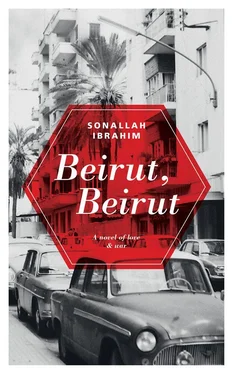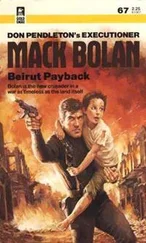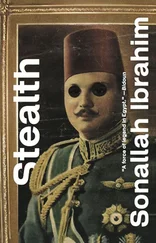He gave a slightly mocking smile, then added: “Is the hero a revolutionary or a Palestinian?”
“Not necessarily either one,” I replied.
He looked at his watch, saying, “We should leave now, before the streets become totally unsafe.”
He paid the bill. I put my bag over my shoulder and we left the bar.
“I’ll get lost if you don’t take me back to the hotel,” I said.
“We’ll go to my house now,” he replied, “and in the morning we’ll get your things from the hotel.”
“There’s no need for that,” I said. “I brought with me the cash I need. And I’ll be getting an advance from Adnan in a few days. He’s agreed to publish the book.”
“You’re coming with me,” he said decisively.
“I don’t want to be a burden on you.”
“I live by myself. My wife and kids are in Cairo now. There’s an empty room you can have.”
We crossed several dark streets without encountering anyone. At one intersection, two armed men came out towards us, aiming the muzzles of their machineguns at us. But they didn’t block our path when we continued walking steadily.
Wadia took a deep breath after we had moved away, and in a muffled voice, said: “They belong to a new organization that took over this street two weeks ago. I don’t know any of their men.”
We crossed a city square dominated by a demolished building, and he continued in his normal voice, “Now we’re in a neighborhood that belongs to the Mourabitoun. I have some ID that shows — I’m one of their members.”
“Why don’t you buy a car?” I asked.
“I have one, but I’m afraid to drive it.”
We headed onto a street lined with buildings of modern construction. Wadia stopped in front of one, the entranceway of which was covered with a sturdy metal screen. He banged forcefully on it while calling in a loud voice, “Abu Shakir!”
In the farthest part of the entranceway there was a door that opened up to reveal an old man with a beard, wearing shabby clothes. In his hand he carried a key ring. When he approached, I noticed that he was girded with a military belt with a revolver hanging from it.
Abu Shakir opened the screen for us in silence, and we took the elevator to the third floor. Then I followed Wadia to a neat apartment of two bedrooms and a sizeable living room. Cushions from the Khan al-Khalili were spread out all over it, and a wooden desk sat in one corner.
“Nice apartment,” I said. “How much do you pay for it?”
“Four thousand dollars a year,” he replied. “The price is cheap because I got it a while ago.”
I sat down on a comfortable couch near the entrance to the living room. Wadia brought a small table over and placed on it a bottle of whiskey, a bucket of ice cubes and two glasses.
“I brought you a bottle of whiskey.”
“Liquor is cheap here,” he said. “They sell it almost at duty-free prices.”
He poured himself a glass, adding, “The different factions collect customs duties from the ports in their areas. The Maronites resort to lowering duties on cigarettes, liquor and television equipment in order to lure businessmen into dealing with their ports, and the others are forced to keep up with them.”
My eyes wandered over the Pharaonic and Islamic antiquities arrayed on the shelves that covered one wall. Among them, I noticed a crucifix with a photo of Pope Shenouda dangling from one end.
I looked closely at it and Wadia’s face turned deep red.
“My wife hung that up.”
I poured a glass for myself and lay back, saying, “Do you remember the woman who regularly visited you in ’68?”
“Who do you mean?”
“The woman who said she charged a fee of fifty lira a session, but because she liked you, she would make it forty.”
He seemed to have forgotten all about it, or pretended that he had. At one point, he had asked me to stay away from the house on certain days of the week, claiming that he was hosting a married Lebanese woman. I noticed her once as I was going out, and her appearance roused my suspicions. When I pressed him, he said that she needed cash in order to replace her refrigerator. She reminded him that she charged a fee of fifty liras, but she liked him, and so she would give him a discount of forty. I expressed my willingness to pay the fifty lira, which he proposed to her, but she refused with disdain, and became angry with him. How could he behave like that when the two of them were in love?
“Are there Egyptian women here?” I asked him.
“Of course,” he replied. “Women looking for adventure, dancers, and women looking to ‘find themselves’. I know one of the female students who participated in the 1973 demonstrations. She settled in Beirut during the war. She came to me one day looking for a place to stay. My wife wasn’t here.”
He lapsed into silence, and I asked him, “And then what?”
“She warned me against taking advantage of the situation, and confidently declared that she would initiate things with me of her own accord if she wanted to.”
“And did she?”
“Once. But I left her.”
“Why?”
“I was afraid.”
He stood up, saying, “This is the time of day when we have access to clean water. It comes early in the morning for two hours. The rest of the day it’s shut off, except for the two hours before midnight. I’ll fill several bottles.”
“You’re luckier than we are in Cairo,” I said as I followed him into the kitchen. “We don’t get a single minute of clean water. Not to mention that our polluted water is shut off for most of the day.”
Wadia gave me his children’s room, and some loose-fitting pajamas, which I declined to use. But despite the overpowering exhaustion I was feeling, I turned over in bed for a long time, unable to fall asleep. I finally dozed off after what I imagined to be the sound of a distant explosion came to an end. But I only slept a few hours, and woke up as soon as sunlight made its way into the room.
I tried to go back to sleep, but to no avail, so I got out of bed. I put on my shirt and pants and went out into the living room. I came upon Wadia reading a newspaper. He was not wearing glasses, so he was holding it up close to his eyes. I said good morning to him and headed toward the bathroom. The water was cold, and there was no trace of heating equipment, despite the presence of two faucets in the sink.
I opened the bathroom door and called out: “How can you live in the ‘Paris of the East’ without hot water?”
“The water heater is centralized, genius. Turn on the left faucet.”
I took a quick bath, then put on my clothes and combed my hair. I walked into the living room. Wadia handed me the paper, saying, “Bad news.”
He read me a headline about new Israeli attacks, using Phantom and Skyhawk planes, against the cities of Tyre and Nabatiya in the south. The victims came to thirty-three injured and killed, with sixteen homes destroyed. Below that was another headline about the return of normal life to West Beirut.
I looked at him inquisitively. He pointed to the lower half of the newspaper, then walked into the kitchen.
There was a report about the arrival of an Egyptian military delegation to Saudi Arabia on a secret visit for shared military planning with the United States. And another report about a memorial service that would take place that afternoon in one of the churches of Hamra, following the funerals of Bashir Ubayd and Kamal Kheir Bek. Buried in the back pages of the newspaper, I found what was causing Wadia concern, under the headline “Loud explosion at dawn”.
The report was terse, but the gist of it was that an explosive charge had been set off at dawn at a publishing house owned by Adnan al-Sabbagh. It caused enormous damage, but no one was hurt.
Читать дальше












